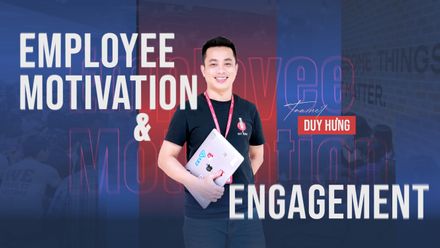Do not assume our goals are not ambitious. Maybe you just have not understood them yet!
Amid the burning atmosphere of setting up new goals for new year, it is certain that any of us will at least once wonder: “Are the goals ambitious enough?” So, what is an ambitious and unambitious goal?
Let’s have a look at the following picture. Do you see a half-full or half-empty glass?

This is a small test to check the attitude of a person towards a particular event, therefore concluding whether he/she is optimistic or pessimistic as well as their perspective toward life. As a result, we will know their perspective toward goals, whether they are promotion focus with ambition or prevention focus with stability.
Of course, when being asked, each person will have their own choice between being optimistic or pessimistic, consequently following one of the two types of goals above. However, I suppose that there are times in life when you change your perspective and follow the other. Therefore, do not judge other goals unambitious when you do not actually know about them and the reasons why they set those goals.
Let me be more specific!
Promotion Focus
A person with a promotion focus will focus on the results and achievements they get. He/she will continuously seek for opportunities, take actions quickly and assertively to achieve what they desire. His/her goals are often ambitious considering his/her present ability, which will further become the motivation for him/her to get out of his/her comfort zone and limits, think creatively in any situation. Once he/she achieves this goal, he/she will definitely “blurt out” excitedly “Whoo-hoo! I did it” and jumps around happily.
A person who is promotion-focused is:
- Having an optimistic spirit, open to new changes, new opportunities.
- Pursue the “change or die” perspective, constantly come up with new ideas and always consider alternatives instead of conventional ways.
- Self-create or find motivation in rewards, praise, and recognition.
- Be willing to accept failure to grow and do better.
It seems that this is the favorite kind of person of any company as they are always making an attempt to move forward and achieve better results, which in general will contribute to the development of the organization. Moreover, the people who keep pushing themselves forward will always inspire and spread motivation both directly and indirectly for others, creating a vigorous and optimistic atmosphere.
For instance, in the previous quarter, a fellow worker sitting next to me set a goal of losing 15 kilograms in 3 months to improve health and keep fit, though it was challenging for a mother of a baby like her to go to the gym and go on a diet. However, she did it. She started by reducing the amount of intake every day, then taking every minute of her free time at work or at home to do exercises. She has inspired our team to keep fit and stay healthy. On a beautiful weekend day in autumn, we - the young who loves sleeping every morning, did get up early to join her on a race. Though we did not lose any weight, we have been more aware of the importance of exercise and formulated the habit of reducing junk food. The whole team, as a result, has a healthier office lifestyle.

Prevention Focus
In contrast with those who are promotion-focused, the people with prevention focus will always want to prevent the negative results and worst-case scenarios. Prevention focused people will prioritize the protection of the results and the best fulfillment of their duties. Once accomplishing a prevention goal, they might say with a sign of relief “I have just dodged a bullets there”
A person who is protection-focused is:
- Always alert and not adventurous, but they often work more slowly and meticulously.
- Analyzing carefully the situation to come up with a safe solution instead of being creative.
- When setting goals, often considering the current ability, knowing for sure that it will be done to perform.
- Get motivated from criticism, suggestions, and reflection from people around.
For example, I have aimed to organize a seminar on Agile courses for my team. Obviously, I have already attended this course, and read and practice enough about Agile to be able to share that knowledge with anyone. I know I can do it for sure, but I still set a goal so that I can make the seminar my priority, and must be done in the next quarter.

By now, I have made clear about two types of goals that I often have or often encounter in life, also the type of goals I have read from a book by author Kathy Gottberg. But what I really want to say is:
Don't say my goals are not ambitious, maybe you just have not understood them yet!
There are many people who think that protection focused goals are not ambitious and we should not set them because they require no effort to be achieved. How to set “ambitious goals” has always been an unanswered question since only the goal setter can evaluate how ambitious their goals are.
The goal might be the same yet at different times, the level of its ambition changed. For example, the handsome and charismatic boyfriend's goal of “getting a lover next month” can become ambitious if he suddenly moves to a company full of fellow employees of the same sex and becomes too busy to date anyone. Therefore, no matter how handsome and graceful he is, our friend will still have to work much hard to accomplish this goal.
Additionally, a protection-focused goal may be less ambitious, which, however, doesn't mean it can't be motivational. Motivation can completely come from the fact that one person has to find ways to preserve his desired outcome. As mentioned, things might change at different times. Therefore, preserving the results of the previous quarter in the next quarter can be absolutely ambitious.
And in particular, we should underrate the goals of others because even the most progressive goal with many positive points does not lack limitations. People who set progressive goals are often too ambitious about the results they will achieve, so they tend to overcompensate. Although they are willing to face mistakes and failures when trying new things without hesitation, the consequences will be unpredictable without a backup plan. And when they do not reach their goals, they often fall into a state of "much hope, much disappointment", which offers more time to recover.

Consequently, defining your target type will help you grasp your strengths and at the same time recognize and compensate for weaknesses. Besides, when you understand other people's goals, you will also have a more objective view of them. Instead of telling others that their goals are not at all ambitious or motivated, give constructive feedback that they can do more, and analyze your vision about the surrounding conditions, the reasons why you think so.
To me, there is no goal that is not ambitious. If someone sets a goal, especially the one which is aligned with their company's goals, that person will certainly work hard to accomplish it. And accomplishing individual goals will also contribute to the overall success of the organization. Thus, whether it is a promotion-focused or protection-focused goal, it creates particular values for that organization and individual. It is essential to respect mutual growth in this present day.

 VI
VI EN
EN



